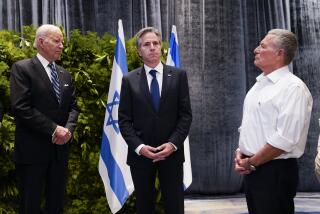U.S. Warns Iraq About Further Threats : Persian Gulf: Saddam Hussein’s remaining troops appear to retreat from Kuwaiti border. Their return could mean immediate retaliation.
WASHINGTON — Iraq appeared to be pulling the last of its elite Republican Guards out of the “no-fly” zone near Kuwait on Sunday, but the Clinton Administration kept the pressure on, warning Iraqi leader Saddam Hussein that the United States may retaliate immediately the next time the troops threaten Kuwait.
A day after the U.N. Security Council approved a resolution ordering the Iraqis to withdraw from the border area with Kuwait, Pentagon officials reported troop movements indicating that the second of two Republican Guard divisions sent south two weeks ago was pulling out and moving northward.
One of the divisions left the area several days ago, but another had remained camped around Nasiriyah, south of the 32nd Parallel, prompting the Clinton Administration to press, over initial Russian objections, for a new Security Council resolution warning the Iraqis that they faced “serious consequences” if they did not withdraw.
The resolution was finally passed unanimously late Saturday after a day of intense negotiations that, for the time being at least, appeared to paper over the Administration’s differences with Moscow over Russian Foreign Minister Andrei V. Kozyrev’s mission to Baghdad last week.
As recently as Saturday, Pentagon officials said that the 10,000 Iraqi troops camped around Nasiriyah were showing no signs of leaving. But although the troops were still in the area Sunday, officials said there were signs that the division was preparing to move north.
“We have indications that the Republican Guards in the Nasiriyah area are beginning to pack their stuff,” one senior Pentagon official said, adding that details were still sketchy but that the preliminary “indications are that they’re moving.”
The officials declined to elaborate, citing the sensitivity of intelligence information, but an Administration source said after a White House meeting between President Clinton and his senior military and foreign policy advisers Sunday that the President was “cautiously optimistic” that the Iraqis were finally complying with the U.N. ultimatum. “But we continue to watch the situation closely to make sure this is not a Potemkin pullout,” the source added.
“We’re not announcing that it’s finished yet . . . but (Hussein) does seem to be moving in the right direction,” Secretary of State Warren Christopher said Sunday on NBC-TV’s “Meet the Press.”
But as the latest Gulf crisis began to recede, it seemed apparent that the Administration had only temporarily bridged a widening gap with Moscow over what to do about Hussein. The Iraqi president has continually refused to comply with a series of Security Council ultimatums that the United States insists must all be met before it agrees to ease any of the trade sanctions that have crippled Iraq’s economy and cut off all its oil exports.
In a clear departure from the Clinton Administration’s position, Kozyrev announced in Baghdad last week that Russia would work toward an easing of the U.N. sanctions in return for what he said was a promise by Hussein to recognize Kuwait and respect its borders. Kozyrev was scheduled to arrive at the United Nations today, and Russian officials sought to delay a vote on the resolution until he had reported to the Security Council.
*
But arguing that Iraq should receive no reward for withdrawing its troops, U.S. officials strongly opposed the Russian initiative and pressed the Security Council to approve a diluted version of the resolution, which warned only that Iraq would face unspecified “consequences” if it failed to withdraw, without specifically threatening or authorizing the use of force. In the end, the resolution passed unanimously--but only after the Russians were given some face-saving language acknowledging the usefulness of Kozyrev’s mission without endorsing its results.
Moving aggressively to counter the impression that the council was divided, Christopher and other senior Administration officials called the resolution a strong warning that puts Hussein on notice that he faces immediate retaliation the next time his troops violate the “no-fly” zone in southern Iraq.
“I think the next time we’ll probably not wait. We will take action, strong action, against him,” Christopher said.
“The message is clear,” Clinton added in a statement released Sunday. “Iraq must complete its withdrawal. It must not threaten its neighbors in the future.”
*
The warnings were echoed and amplified by U.N. Ambassador Madeleine Albright, who said that the United States felt it already had the authorization under previous U.N. resolutions to use force against Iraq and that it reserves the right to do so “multilaterally when we can and unilaterally when we must.”
The significance of the Security Council vote, she said Sunday on ABC-TV’s “This Week With David Brinkley,” is that “the international community agrees with us that Saddam Hussein cannot keep being a repeat offender.”
The thrust of all these remarks, other officials conceded privately, was aimed at discouraging Hussein from trying to take advantage of what still seemed to be U.S.-Russian divisions over how to handle Iraq.
In Kuwait, however, officials said they were satisfied that the resolution gave the U.S.-led allied force in the area the authorization to reply with force if the Iraqis fail to complete their withdrawal.
“This gives a clear mandate to the coalition here to see that there will not be any repetition of such activities by Iraq,” Kuwaiti Information Minister Saud al Sabah told The Times. “It’s so wide open that the coalition now can decide exactly where to draw the line in the sand.”
The “whole picture has turned now,” he added, “and . . . any possibility that Iraq might pursue other ways of lifting sanctions is going to be very futile.”
Times staff writer Scott Kraft in Kuwait City contributed to this report.
More to Read
Sign up for Essential California
The most important California stories and recommendations in your inbox every morning.
You may occasionally receive promotional content from the Los Angeles Times.










